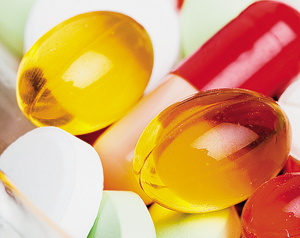|
|
HOME >>
API >>
API List 3 >>
Quinine Sulfate >> Consumer Information

CONSUMER INFORMATION
Quinine Sulfate CAS number 130-95-0
USES: This medication is used to treat a parasite infection of the red
blood cells (malaria caused by Plasmodium falciparum). Quinine sulfate
belongs to a class of drugs known as antimalarials. It works by killing the
form of the malaria parasite that infects the red blood cells.It has not
been shown to work for this use and may cause serious side effects.
HOW TO USE: Read the Patient Information Leaflet provided by your
pharmacist before you start using quinine and each time you get a refill. If
you have any questions, consult your doctor or pharmacist.
Take this medication by mouth with or without food exactly as prescribed by
your doctor. This medication is usually taken every 8 hours for 7 days or as
directed by your doctor. If you have stomach upset with quinine, take it
with food.
Dosage is based on your kidney function, medical condition, and response to
therapy.
It is very important to continue taking this medication exactly as
prescribed by your doctor. This medication works best when the amount of
drug in your body is kept at a constant level. Therefore, take this drug at
evenly spaced intervals. To help you remember, take it at the same times
each day.
Do not take more or less of this drug than prescribed. Do not stop taking it
before completing this prescription unless directed to do so by your doctor,
even if you feel better. Skipping or changing your dose without approval
from your doctor may cause the amount of parasite to increase, make the
infection more difficult to treat (resistant), or worsen side effects.
SIDE EFFECTS: Headache, flushing, unusual sweating, nausea, ringing
in the ears, decreased hearing, dizziness, blurred vision, and temporary
changes in color vision may occur. Less common side effects may include
signs of low blood sugar (e.g., sweating, shakiness, confusion, extreme
hunger). If you experience these symptoms, promptly drink some fruit juice
or have a snack, and call your doctor immediately. If any of these effects
persist or worsen, tell your doctor or pharmacist promptly. Tell your doctor
immediately if any of these rare but very serious side effects occur: signs
of a serious immune system problem (e.g., unusual tiredness, joint/muscle
aches, unusual fever, butterfly-shaped facial rash, swollen glands), easy
bruising/bleeding, signs of serious infection (e.g., high fever, severe
chills, persistent sore throat), signs of a sudden loss of red blood cells
called hemolytic anemia (e.g., severe tiredness, brown urine, pale
lips/nails/skin, rapid breathing at rest), signs of severe liver problems
(e.g., persistent nausea/vomiting, abdominal pain, severe weakness, yellow
skin/eyes, unusually dark urine), decrease in the amount of urine. A very
serious allergic reaction to this drug is rare. However, seek immediate
medical attention if you notice any symptoms of a serious allergic reaction,
including: rash, itching, swelling, severe dizziness, trouble breathing.
PRECAUTIONS: Before taking quinine, tell your doctor or pharmacist if
you are allergic to it; or to quinidine or mefloquine; or if you have any
other allergies.
This medication should not be used if you have certain medical conditions.
Before using this medicine, consult your doctor or pharmacist if you have:
previous serious side effects with quinine (e.g., blood problems), certain
heart problems (congenital or acquired long QT syndromes, torsade de
pointes), very low blood potassium, a certain enzyme problem
(glucose-6-phosphate dehydrogenase deficiency-G6PD), a certain nerve/muscle
disease (myasthenia gravis), a certain eye nerve problem (optic neuritis).
Before using this medication, tell your doctor or pharmacist your medical
history, especially of: certain heart rhythm problems (atrial
fibrillation/flutter), kidney problems, severe liver problems, family
history of favism/G6PD deficiency.
This drug may make you dizzy. Use caution while driving, using machinery, or
doing any activity that requires alertness. Avoid alcoholic beverages.
Before having surgery, tell your doctor or dentist that you are taking this
medication.
Caution is advised when using this drug in the elderly because they may be
more sensitive to the effects of the drug, especially dizziness, irregular
heartbeat, and low blood sugar.
MISSED DOSE: If you miss a dose, take it as soon as you remember. If
it is within 4 hours of the time for the next dose, skip the missed dose and
resume your usual dosing schedule. Do not double the dose to catch up.
STORAGE: Store at room temperature between 77-86 degrees F (25-30
degrees C) away from light and moisture. Do not store in the bathroom. Keep
all medicines away from children and pets.
 |










